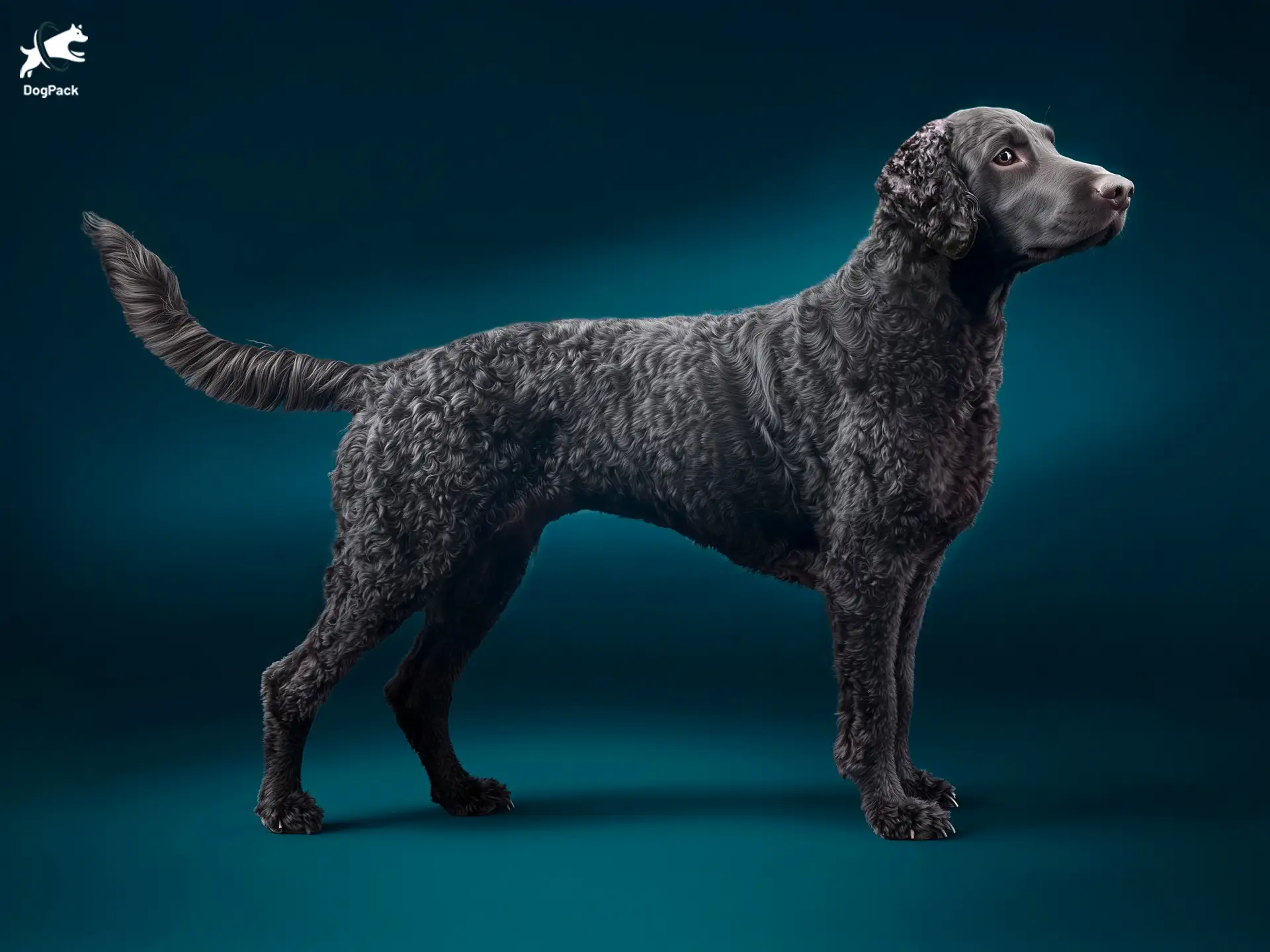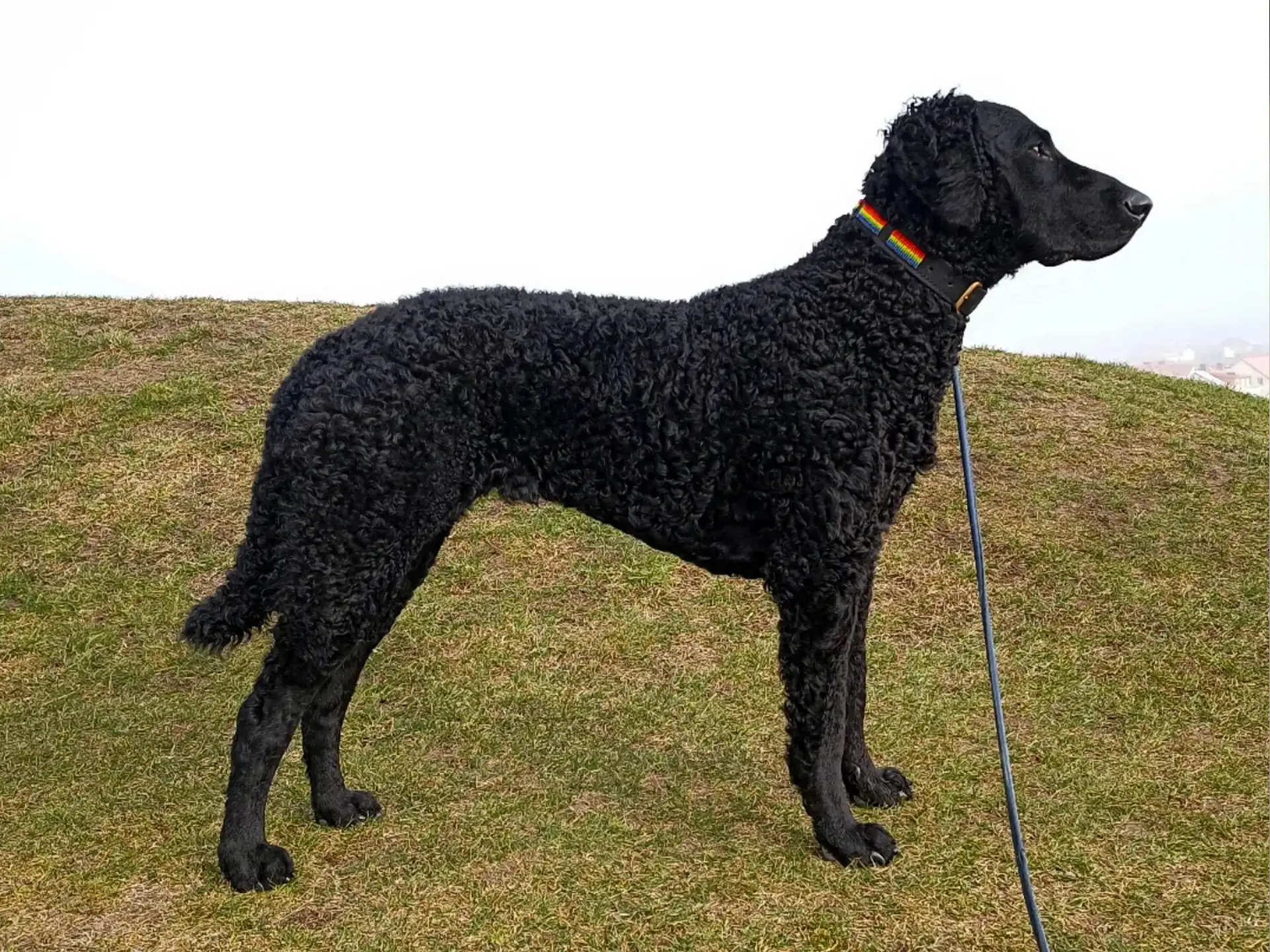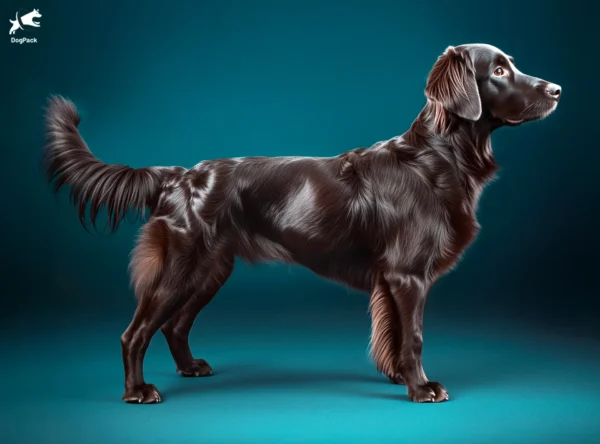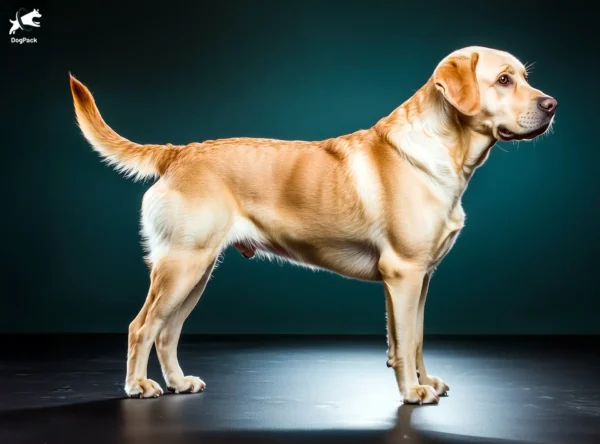Curly-Coated Retriever Dog Breed Info & Overview
The Curly-Coated Retriever, known for its unique tight curls and lively personality, is a breed that stands out in both appearance and spirit. This energetic dog is not only a skilled hunting companion but also a loyal family pet with a warm, affectionate nature. For those who love adventure and are looking for a devoted friend, the Curly-Coated Retriever could be the ideal match.
Characteristics
Pictures
Breed History
The Curly-Coated Retriever’s story goes back to 18th century England, where they were first bred for retrieving game birds. With early ancestors like the English Water Spaniel and St. John’s Newfoundland, these dogs were a gamekeeper’s best friend, built for stamina and strength. The Curly-Coated Retriever quickly gained popularity for its versatile abilities on land and water.
By the 19th century, this breed was a staple among hunters, known for braving harsh terrains and cold rivers without hesitation. Their unique curly coat wasn’t just for looks; it provided insulation and protection from prickly underbrush. And while many breeds faced decline after World War II, the Curly-Coated Retriever had a dedicated fan base determined to preserve it.
Today, this breed remains rare yet beloved among hunting enthusiasts and families alike. Their history reflects a balance of grit and grace, marking them as one of the oldest and most resilient retrievers. If you’re captivated by a breed that’s part history and part heart, the Curly-Coated Retriever fits the bill.
Temperament, Personality
Curly-Coated Retrievers are confident and intelligent, with a dash of independence that makes them unique. They’re affectionate with family members, often forming strong bonds with “their people.” But don’t let their reserved demeanor fool you; they’re playful and love a good romp around the yard.
When it comes to strangers, they can be a bit aloof, but early socialization helps them warm up. Their alertness makes them excellent watchdogs—just enough to keep an eye out without excessive barking. They’re loyal to their core, and their gentle nature makes them great around kids and other pets with proper introductions.
These retrievers aren’t clingy but enjoy companionship and need engagement to keep their minds busy. With the right balance of activity and affection, the Curly-Coated Retriever can be the perfect mix of laid-back family dog and spirited outdoor companion.
Physical Characteristics
The Curly-Coated Retriever stands out thanks to its dense, curly coat that’s as functional as it is eye-catching. Their coat provides protection from water, cold, and rough landscapes, making them excellent outdoor dogs. They’re one of the taller retrievers, with males reaching up to 27 inches at the shoulder, boasting a lean yet powerful build.
Their sleek physique allows them to move with agility and speed, traits essential for a hunting breed. Coats are solid black or liver, with dark almond-shaped eyes that give them a keen, intelligent expression. This breed’s ears are small and set close to the head, staying out of the way when they’re on the hunt.
A Curly-Coated Retriever’s tail is another distinctive feature—carried straight and strong, it’s covered in curls that add to their charm. All in all, they exude elegance and strength, ready to impress both in the field and at home.
Health Issues
While Curly-Coated Retrievers are generally healthy, they can face a few breed-specific issues. Hip dysplasia is one concern, so choosing a breeder who screens for it is crucial. Bloat, a condition affecting deep-chested breeds, can be life-threatening; feeding smaller, frequent meals helps reduce this risk.
Eye conditions like Progressive Retinal Atrophy (PRA) and cataracts can occur, so regular eye exams are essential. Another lesser-known issue is glycogen storage disease, a genetic disorder affecting energy storage. Routine vet check-ups and early screenings can help catch and manage these health concerns.
Overall, the Curly-Coated Retriever is hardy, and a balanced diet and active lifestyle contribute to their well-being. With attentive care, they can enjoy a long, healthy life by your side.
Grooming Needs
Despite its curly locks, grooming a Curly-Coated Retriever is easier than you’d expect. Their coat naturally repels dirt and water, requiring brushing only once or twice a week to remove loose hair. When shedding season hits, a bit more brushing keeps their coat in top shape.
Bathing every few months is enough unless they get particularly muddy. Their curls should be left to air dry naturally for the best look. Regular ear checks prevent infections, especially since water can get trapped in those curls. And don’t forget regular nail trimming and dental care.
This breed’s grooming routine is manageable, but their unique coat means they may need occasional professional grooming. A bit of regular TLC keeps them looking sharp and feeling great.
Exercise Requirements
High energy and intelligence mean the Curly-Coated Retriever thrives with daily exercise. They need about 1–2 hours of physical activity, from brisk walks and runs to active play sessions. Water-loving by nature, swimming is an ideal workout that keeps their joints healthy and mind engaged.
They excel at agility and obedience training, so consider dog sports or even dock diving. These activities channel their natural retrieving instincts and build a strong bond between you. Mental stimulation is just as important; puzzle toys and scent games are great boredom-busters.
Without enough exercise, they may become restless or bored, so an active lifestyle is essential for their happiness. They’re perfect companions for outdoor enthusiasts ready to explore the world with a loyal friend.
Training Tips
Training a Curly-Coated Retriever requires a patient, positive approach. They’re intelligent and eager to please, but their independent streak can make them a tad stubborn. Reward-based training works best, with treats and praise keeping them motivated.
Starting training early helps establish good habits, and socialization with other dogs and environments builds their confidence. They benefit from structured activities, like obedience and retrieval games, which engage their minds and reinforce your bond.
Keep training sessions short and varied to maintain their interest. Curly-Coats love a challenge, so incorporating fun tasks, like scent work or agility, keeps them engaged and sharpens their natural abilities.
Nutrition, Diet
A Curly-Coated Retriever needs a balanced, protein-rich diet to support their active lifestyle. High-quality dog food formulated for large, athletic breeds works well. Portion control is essential, as overeating increases the risk of obesity and bloat, common in deep-chested dogs.
Typically, they require about 2.5 to 3.5 cups of food per day, divided into two meals. Foods with glucosamine and omega-3 fatty acids help maintain joint and coat health, especially as they age. Avoid fillers; their bodies do best with nutrient-dense foods.
Always consult with your vet to tailor their diet based on their age, activity level, and health status. Keeping them fueled right means a happy, energetic companion.
Adoption, Breeders
Finding a Curly-Coated Retriever may take some time, as they’re not the most common breed. Start with organizations like the Curly-Coated Retriever Club of America, which can provide reputable breeder referrals and even adoption opportunities for Curly-Coats in need of homes.
When working with a breeder, ask about health clearances for genetic issues like hip dysplasia and PRA. Visiting the breeder and meeting the puppy’s parents gives you a sense of their temperament and care. Avoid online listings without thorough research, as responsible breeders prioritize health and well-being.
Breed-specific rescues or retriever adoption groups can sometimes have Curly-Coats available. Connecting with these communities offers a great start in finding your new companion.
Family Pet?
Curly-Coated Retrievers make excellent family pets, especially for active households. They’re affectionate and love being part of family activities, from hiking to playing fetch. With early socialization, they get along well with children and adapt well to the family routine.
Due to their size and energy, supervision is recommended with younger children. They may also need guidance around smaller pets, given their retrieving instincts. Consistent socialization ensures they’re well-mannered and gentle with family members.
Their friendly nature and loyalty make them wonderful additions to family life. With the right amount of exercise and engagement, they’re a devoted, joyful companion for all ages.
Right For You?
The Curly-Coated Retriever is ideal for active individuals or families who enjoy the outdoors and can meet their exercise needs. They require a home that understands their independent nature and is prepared for consistent training and mental stimulation.
Their grooming is manageable, but they do need regular attention to keep that unique coat healthy. Potential owners should be ready for an energetic, loyal companion that thrives on activity and family involvement.
If you’re looking for a one-of-a-kind, loyal dog with both intelligence and playfulness, the Curly-Coated Retriever may be the perfect fit.
Conclusion
The Curly-Coated Retriever is a rare blend of elegance, intelligence, and spirit, perfect for those who appreciate a distinctive companion. Their loyalty and love for family make them a treasured addition to any active household. With regular grooming, training, and exercise, this unique breed offers a lifetime of friendship, fun, and loyalty. Ready for a dog that brings both energy and affection? The Curly-Coated Retriever could be your ideal match.
FAQs
-
Are Curly-Coated Retrievers good swimmers?
Yes, Curly-Coated Retrievers are excellent swimmers. Their water-resistant curly coat and natural affinity for water make them well-suited for swimming activities, which they often enjoy and excel at.
-
How much do Curly-Coated Retriever puppies cost?
Curly-Coated Retriever puppies can range in price from $1,000 to $1,500, depending on the breeder, lineage, and location. Due to their rarity, prices may be higher, and prospective owners should seek reputable breeders.
-
Do Curly-Coated Retrievers shed a lot?
Curly-Coated Retrievers shed moderately throughout the year, with heavier shedding occurring seasonally. Regular grooming can help manage shedding, but they are not considered hypoallergenic.
-
Are Curly-Coated Retrievers suitable for apartment living?
Curly-Coated Retrievers are generally not ideal for apartment living due to their large size and high energy levels. They thrive in homes with ample space and access to outdoor areas for exercise.
-
What colors do Curly-Coated Retrievers come in?
Curly-Coated Retrievers come in two solid colors: black and liver (a rich brown). Their distinctive curly coats are always one of these two colors without any markings.
Breed Ratings
The Curly-Coated Retriever is highly intelligent, which aids in training but may require mental stimulation to prevent boredom.
This breed is very playful and enjoys interactive games, making them great companions for active families and individuals.
With a high energy level, they need ample daily exercise to stay healthy and content, thriving on physical activities.
They shed moderately, especially during seasonal changes, so regular grooming helps manage loose hair.
As hunting dogs, they have a strong prey drive and may chase smaller animals if not properly trained.
Their curly coat requires regular maintenance to prevent matting, including occasional brushing and bathing.
Intelligent but sometimes independent, they respond well to positive reinforcement but may need consistent training.
They prefer company and may develop separation anxiety if left alone for extended periods.
They are not excessive barkers but will alert their owners to strangers or unusual situations.
Curly-Coated Retrievers have minimal drooling, making them a relatively clean breed in this regard.
Generally good with other dogs, especially when socialized early, they enjoy canine companionship.
They are generally healthy but prone to certain genetic conditions, so regular veterinary care is important.














